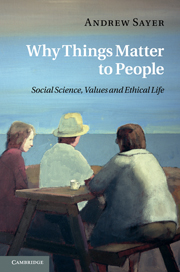Book contents
- Frontmatter
- Contents
- Acknowledgements
- 1 Introduction: a relation to the world of concern
- 2 Values within reason
- 3 Reason beyond rationality: values and practical reason
- 4 Beings for whom things matter
- 5 Understanding the ethical dimension of life
- 6 Dignity
- 7 Critical social science and its rationales
- 8 Implications for social science
- Appendix: Comments on philosophical theories of ethics
- References
- Index
Appendix: Comments on philosophical theories of ethics
Published online by Cambridge University Press: 05 June 2012
- Frontmatter
- Contents
- Acknowledgements
- 1 Introduction: a relation to the world of concern
- 2 Values within reason
- 3 Reason beyond rationality: values and practical reason
- 4 Beings for whom things matter
- 5 Understanding the ethical dimension of life
- 6 Dignity
- 7 Critical social science and its rationales
- 8 Implications for social science
- Appendix: Comments on philosophical theories of ethics
- References
- Index
Summary
The account I have given of lay normativity and ethical life is the product of an engagement with theories of ethics in philosophy, with social scientific, and particularly sociological, approaches to values and morality, and to a lesser extent with moral psychology. Readers may perhaps want to know more about where I stand with respect to philosophical theories. Though my debts to philosophy are large, there are some well-known theories that I reject. Here I will briefly outline the main reasons behind this selection.
Many of the philosophical approaches are too idealized and reductive for the purpose of understanding the ethical dimension of social life as it is rather than as one might hope it would be, though they may have some use precisely where lay morality is deficient. Some ethical theories attempt to derive their conclusions from a single principle, such as ‘utility’ or the categorical imperative. For William James, the pragmatist philosopher, it is as absurd to expect that ethics can be reduced to a single motive or principle as to expect physics to be reducible to a single law (James, 1891). I have some sympathy with Bernard Williams's view that the search for grand ethical theories is misguided, and we would do better to attend to concrete situations and the many different kinds of social relation in which we act (Williams, 1985; see also Geuss, 2008; Putnam, 2002; Walsh, 2003).
- Type
- Chapter
- Information
- Why Things Matter to PeopleSocial Science, Values and Ethical Life, pp. 253 - 263Publisher: Cambridge University PressPrint publication year: 2011



